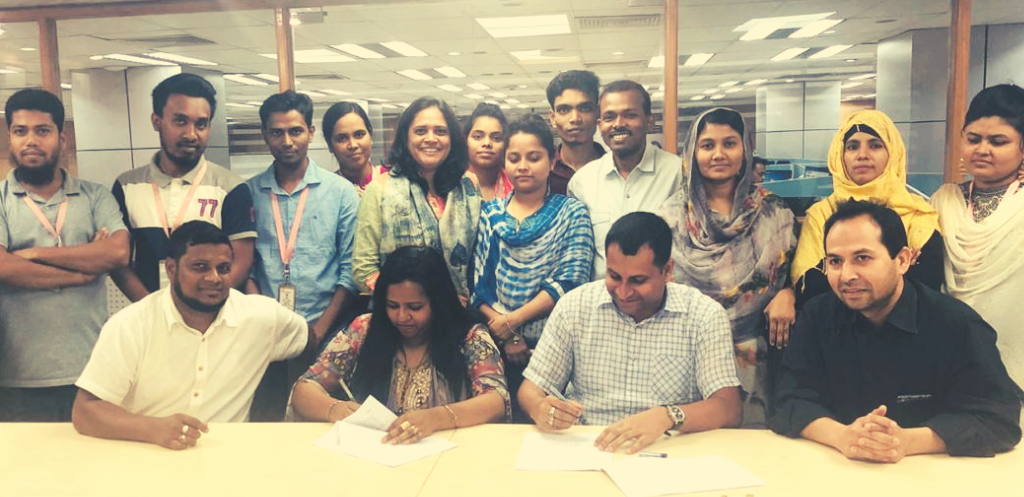
Hoplun garment workers sign their collective bargaining agreement with factory management. Nazma Akter of Sommilito Garment Sramik Federation looks on, fifth from left in back row.
To improve conditions and benefits for staff, workers at Hoplun Apparels in Gazipur, Bangladesh, needed to register their union. But by law, at least 30 percent of the factory’s 6000-strong workforce needed to join it, with documents submitted to the Department of Labour. (In September 2018, this threshold was cut to 20 percent.)
Nazma Akter, founder and president of Sommilito Garment Sramik Federation (SGSF), was a driving force behind the creation of the new union. Nazma, a seasoned activist and herself a former garment worker, has 30 years of experience in mobilising workers for their rights, and SGSF has more than 70,000 garment workers in its membership.
The garment industry in Bangladesh is heavily connected with government – many politicians are business owners. And although – or arguably because – this sector comprises the country’s principal source of foreign exchange earnings, there is a conspicuous lack of regard for the workers on whom this industry depends. Six years after the Rana Plaza tragedy turned the international spotlight on Bangladesh, safety standards have improved but there is still a long way to go in terms of workers’ rights. Institutional barriers remain in place; corporate hegemony funneled through the government ensures a status quo that privileges business interests over human ones.
The Hoplun workers’ first submission to the labour department was rejected, resulting in considerable tensions behind the scenes. The workers were not happy – but the decision was out of Nazma’s hands. However, representatives of other unions visited them to share their own experiences, and convinced them that this was a necessary struggle.
Optimistic, they submitted again, and again their application was rejected. There were suspicions that the company might have been able to influence this result.
Nazma was concerned. She wanted to avoid a strike or a riot, both of which were common. The union members were angry; some claimed that she had no power and couldn’t do anything. She needed to find a way to resolve the issue peacefully.
Thanks to SGSF’s affiliation to the global union IndustriALL, support began to arrive from trade unions in Europe. At the same time, it was important for SGSF to keep the company informed of the process. The factory makes clothing for numerous European brands, and some of these – though by no means all – were also supportive of the drive for a union.
This pressure from the inside as well as the outside had a positive effect, building momentum so that the company was more open to listening to Nazma’s advocacy for the workers. One of the brands contacted its Hong Kong office, whose representatives visited Bangladesh to enquire about the rejection, asking to see the documents. That brand also facilitated an introduction between Nazma and the factory’s management – after which the company expressed its cooperation.
The union requested to hold a recruitment drive in the factory during lunch and break times – to which the company agreed. After the requisite percentage of the workforce had signed up, the union passed the list of membership details to the company for certification of the documents. And finally, they were ready to apply to the labour department for a third time.
This time, the union’s application was granted. It had taken around a year and a half to get this far.
The 24-point collective bargaining agreement was signed on 10 March 2019. Nazma identifies its greatest victories: an increase in salary for all workers; free ultrasounds for pregnant workers; provision of free sanitary napkins for women workers; extension of the factory’s daycare facilities to all workers’ children aged below six years old; quarterly provision of medical facilities at the workplace until a medical centre is established; and the formation of an anti-sexual harassment committee.
Given the long struggle for recognition of a union, and all the mental distress that this process entailed, their victory is all the sweeter. But the Hoplun workers’ story shines a light on the bureaucratic obstacles to worker organising and reminds us that it is a complicated business. Collective action from multiple parties ensured that the workers’ demands were met – and continued pressure is necessary to change a system that puts workers last.
See also:
Ayliffe, D., Meet the Bangladeshi Women Leading a Revolution, Channel 4, 1 May 2014.
Tripathi, S., Nazma Akter on Mistreatment of Women Workers in the Supply Chain, Institute for Human Rights and Business. Podcast audio, 16 March 2018.
Young, H., ‘Without Stronger Unions, Rana Plaza Will Happen Time and Time Again’, The Guardian, 24 April 2014.

